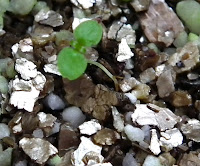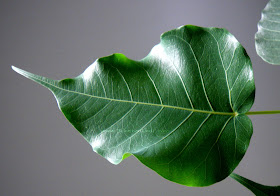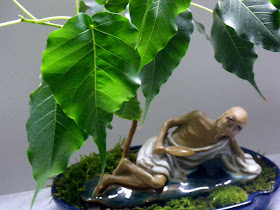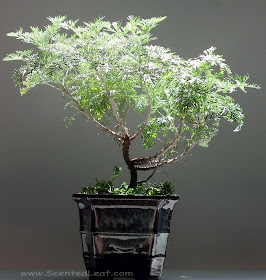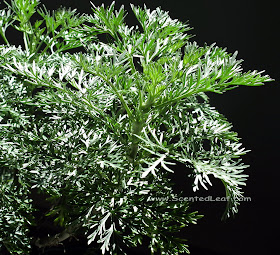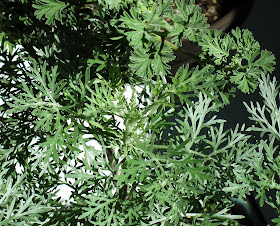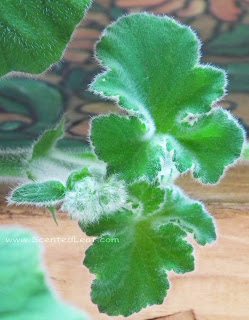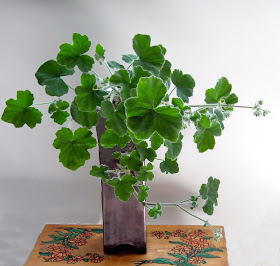Pelargonium x fragrans has an attractive foliage with spicy-nutmeg fragrance. There are many x fragrans varieties derived from the wild pelargonium fragrans, all of them prolific bloomers (a real delight for the
foraging bees), drought resistant plants with soft, lobed, slightly undulated leaves.
 |
| Pelargonium x fragrans: Tutti-Fruity (left) and White-Nutmeg (right) |
There are many traits inherited from their parent, the true pelargonium fragrans, the most important being the smell of the leaves: a powerful nutmeg spicy scent having various fruity, chocolate, cloves undertones. Below are just some characteristics of the cultivars from our collection:
-
Pink Nutmeg:
* large rounded fan-shaped leaves with nutmeg-spicy flavor and a slightly chocolate undertone beneath the nutmeg fragrance.
* short stems with greenish color when young which became woody when aging, having bushy growing habit with clusters of leaves starting freely almost from the same spot of the stem
* blooming from spring to autumn with clusters of pink flowers with dark red veins on the upper petals
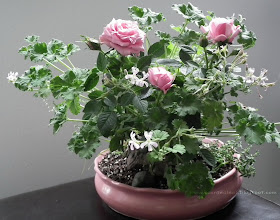 |
| Pelargonium x fragrans: pink - nutmeg variety |
-
White Nutmeg:
* large fan- shaped leaves with nutmeg-spicy fragrance and a cloves undertone beneath the nutmeg fragrance,
* stems with greenish color when young and became woody when aging,
having a compact growing habit, columnar (more than 50 cm high) with
many branches.
* prolific bloomer with umbels of white flowers with pink lines on the upper petals
 |
| Pelargonium x fragrans on driftwood: White-Nutmeg variety |
-
Tutti - fruity :
* green leaves with small, soft and crinkled undulated lobes exulting
fruity-spicy fragrance, with some cider undertones.
* dwarf cultivar with short stems with greenish- redish color when young and became woody when aging, having bushy growing habit with many branches
* prolific bloomer with clusters of white flowers with pink lines on the upper petals
 |
| Pelargonium x fragrans: Tutti-Fruity cultivar |
- " Old Spicy"
* light green lobed leaves, larger than " Tutti-Fruity" cultivar but with similar fruity- spicy smell with cider undertones (is said that "Tutti-Fruity" is derived from it and inherited various traits from "Old Spicy" variety).
* stems with greenish- redish color when young and became
woody when aging, with freely columnar growing habit with many branches
* prolific bloomer with clusters of white flowers ( larger than flowers of "Tutti-Fruity" cultivar, too) with pink lines on the upper petals
 |
| Pelargonium x fragrans Old-spice cultivar |
- " Apple - Nutmeg"
* a cross between pelargonium fragrans and pelargonium odoratissimum,
* green leaves with small, soft and crinkled undulated lobes exulting a sweet apple-nutmeg fragrance,
* bushy plant growing freely, making many short stems when young which became
woody when aging,
* prolific bloomer covered all the summer with clusters of small white flowers, flower buds and seed pods
 |
| Pelargonium x fragrans: Apple - Nutmeg cultivar |
Indeed, they come all shapes and sizes, all with fine undulated leaves and plenty of flowers. Their smell has been fascinating me since first day when I've discovered them. I can never define it exactly, and I always have fun discovering new perfume notes from the greater world of scented pelargonium fragrances.

